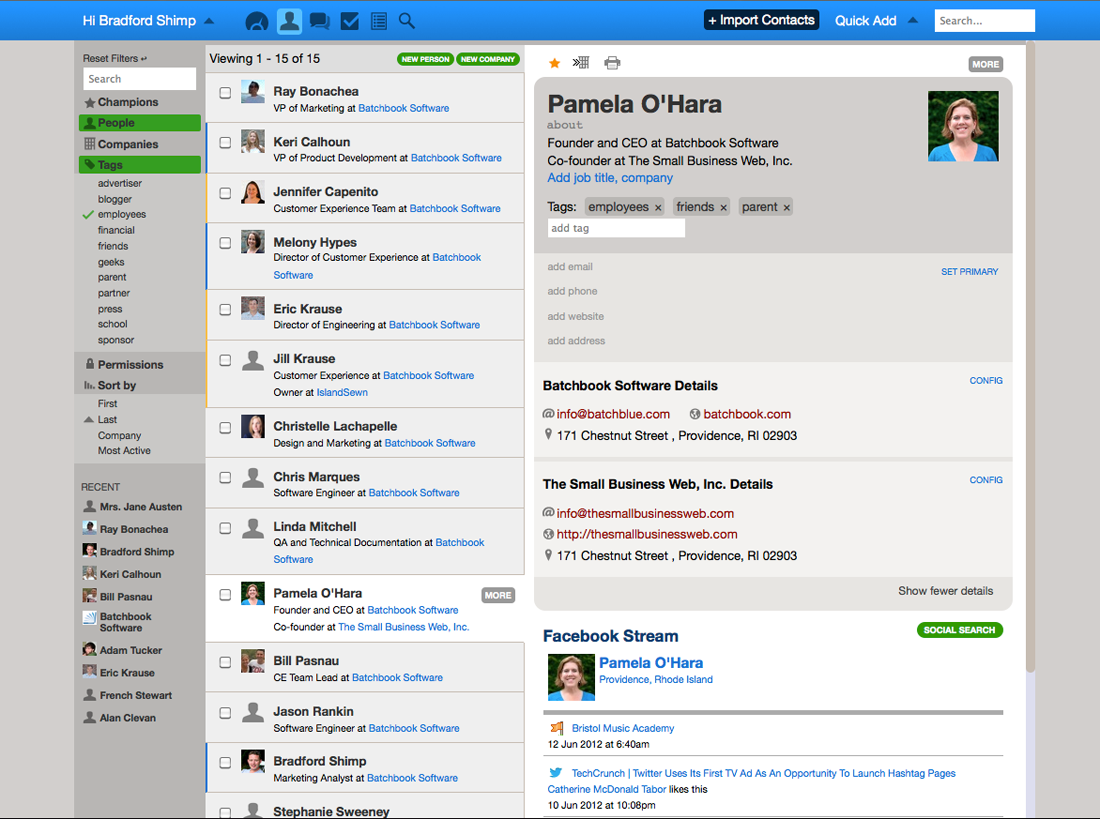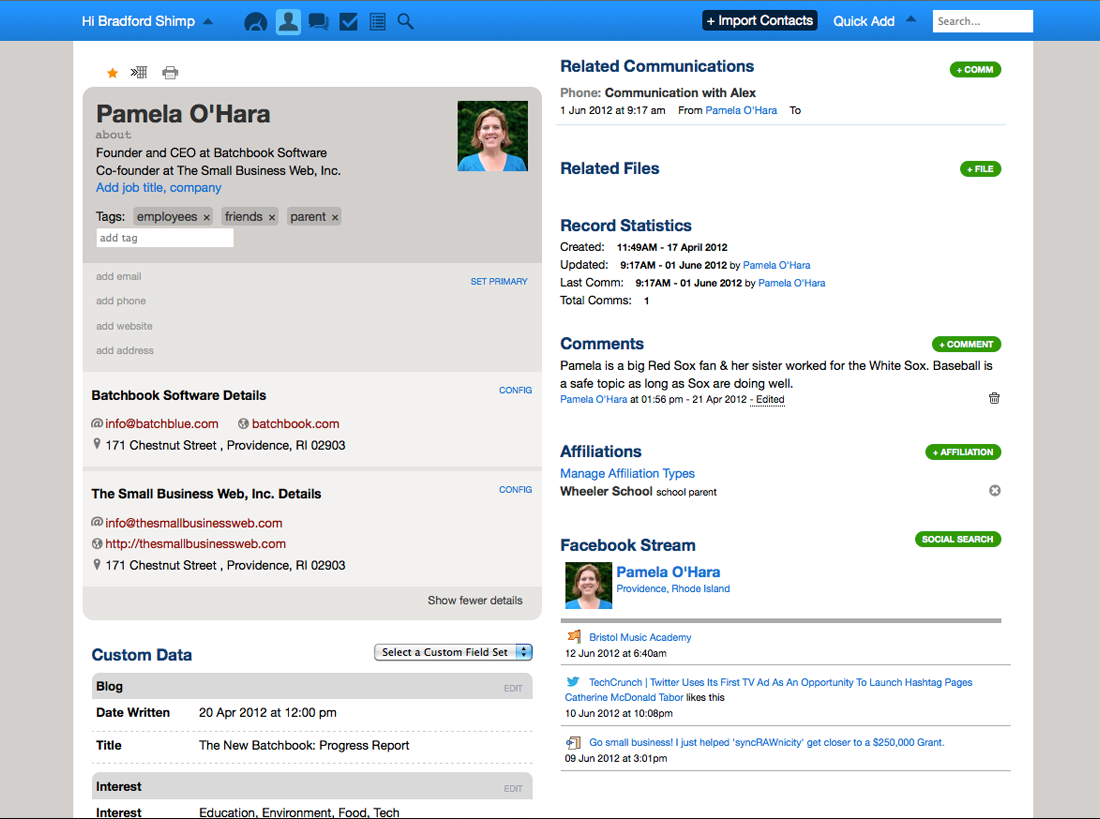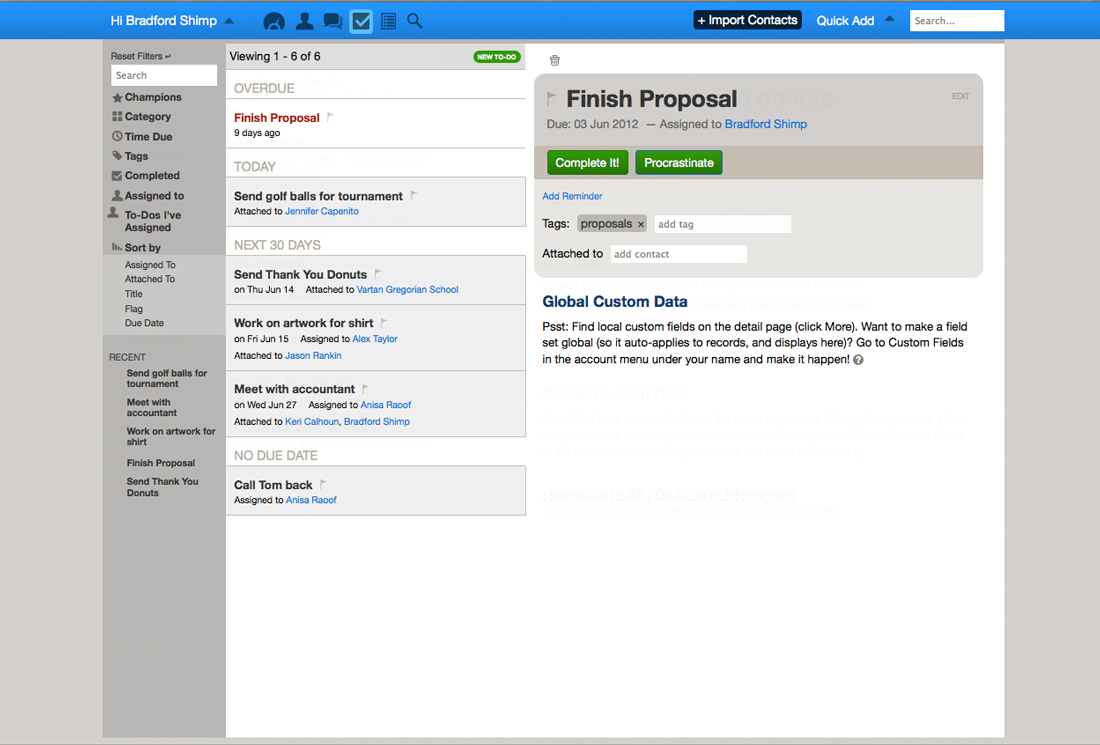Social CRM
Batchbook: Helping Small Businesses Grow with Social CRM

BatchBlue’s Batchbook is a social CRM solution designed for very small businesses. A co-founder of the Small Business Web, a non-profit for open API start-ups, CEO Pamela O’Hara believes all software should be open and integrated, so that small businesses can have access to the same functionality as large enterprises. Pamela joined us for a conversation on CRM and BatchBlue’s unique position in the market.
What is your mission?
We provide very small businesses with technology that allows them to grow. That was what we originally set out to do, and that’s what over the years we continue to come back to. We’ve spent a lot of time asking ourselves: what does small business mean, what does growing mean, what does success look like for a small business? We want to build tools that will help those very small businesses – start-ups, entrepreneurs, one-to-three person teams – grow and succeed.
CRM is a hot market these days. What made you want to add your own solution to the mix?
I have a background in web and application design. In the late 90s, I co-founded a company in Washington D.C. that built custom web apps for companies to help them create membership applications and directories. Five years later, I moved up to New England, looking for something new to get involved in. I had two kids by then, and so I wasn’t working full-time anymore, but I somehow managed to squeeze in some consulting up here. I ended up doing software consulting for a number of small businesses, and what many of them were looking for was a way to manage communications with their customers. It all came down to the same problem for them: they couldn’t afford Salesforce or similar big solutions, but their need for data management was the same as Nike and all the businesses that could afford big ERP and CRM systems. In fact, start-up businesses depend even more on keeping track of individual relationships because in the early stages, every customer is extremely important. Often when people choose to go into business with a smaller company, it’s because of those strong relationships. After doing an extensive but ultimately fruitless search for something that would help these small businesses, I decided to build it myself.
What do you do differently, besides your focus on smaller companies?
We do a lot of the things the SugarCRMs or Zohos of this world do as well, but we make them easier and we speak the language of the small businesses. By that I mean, we speak English and not MBA. We focus on building relationships with your customers, not on how to push leads through your pipeline. We say, “You need to reach out to your customers. You need to make sure you know who is doing what in the market. You need to follow up with your customers.” We focus on making sure everyone realizes the value of sharing information across the team.
How is your company set up? Where are your offices and employees located?
We are headquartered in Rhode Island. We have about 20 people on staff right now, with a few remote offices: one in Seattle, one in New York, and one in Florida. Our Engineering team is located in Providence, RI. Remote folks are mostly on the Marketing or Support teams.
What do your sales look like? How do you actively recruit new customers?
Our sales cycles are pretty short. We are B2B but almost acting like a B2C. Small businesses are more like a consumer than a business, because very frequently it’s just one person running the show or at least making office decisions. So you don’t have to go through all the approval processes. Often you’re working with someone’s spouse, because they are the ones who have the time to do the research and suggest a vendor to the business owner, who then signs up for a short trial and ultimately makes a decision. That is why for us, ease of use is so important. If you’re investing tens of thousands of dollars per year in a system, it’s worth your while to spend a lot of time and money on training and customization and integration and maybe even bringing in a third party to set it all up. But when you have just a few thousands dollars to spend on your software, you’re not going to invest all that time and money on getting yourself up to speed. All our new accounts come with two hours of consultation with our on-boarding specialists, but most people get it within an hour. We really optimize around productivity, speed, and ease of use.
How many customers do you have?
We don’t publish the exact number, but we have thousands of customers worldwide. About 40 percent of our business it outside of the US, largely in English-speaking countries.
Where do you feel the CRM market is headed? Where do you see it in 5 years?
I think it’s going to be very mobile. The CRM industry is starting to realize how integrated it is with all the other systems businesses use, and this trickles down even to the micro-businesses that we work with. The line is blurred between all of the other processes that businesses use. Where does your accounting software stop and where does CRM start? So we’re seeing a lot of acquisitions in the market. The mindset that CRM is for Sales only is changing. It’s customer service, market research, sales pipeline, customer satisfaction, and more.
What are some of the challenges you’re seeing?
The biggest challenge for people is spending the time to keep info up to date. That’s where we really see people struggle. Time challenges are something we all face, especially very small businesses. Time is more of challenge even than money. As an industry, our job is to do everything we can to keep making things easier. Batchbook already has a lot of integration points into other systems so you don’t have to enter information into your accounting package and your CRM system and whatever else you use, but there’s still more to be done.
Can you speak to the unique office culture at BatchBlue?
When we started this, one of the important things for me was having a very flexible business culture. That comes in the form of office hours, but also location and being open in trusting my employees to be able to understand the mission of the organization and take responsibility for their part in it. There are lot of ways we have done that. The first two years, we were all virtual. That was great for the workday, but it was awful for meetings. So we got an office space and bring our remote staff here quarterly. We also have team meetings where all the remote staff are up on big screens. We want to catch the eye-rolling, not just someone’s tone of voice. Another thing we do is “parenting hours.” A lot of people work until two or three, then they leave to pick up their kids from school, and they’re back online around seven or eight. We all work scattered schedules, but we do have core office hours where we know certain people will be around. Lastly, we take mandatory vacations. Every employee, from day one, gets five weeks of mandatory vacation. What I tell people is, “Take it, don’t fake it. Don’t go on vacation with your laptop.” The reason we do that is twofold. One, it’s so important for people to take a brain break and be engaged with their family and their passions. It’s important re-energize yourself regularly. As a business, however, it’s important as well to be forced to survive without certain people for a week. When our network administrator is gone, for instance, everyone else is responsible for the passwords and what not. It load balances what everyone is doing. I don’t like using the phrase “if you get hit by a bus,” but I tell people, “We need to make sure we’re covered in case you win the lottery.”
Who are the most interesting people in your segment right now and why?
There are so many people doing something worthwhile. One of the things BatchBlue has done is found a non-profit organization called the Small Business Web. It includes everyone from Google to Intuit to garage-level start-ups. In order to be in this organization you have to serve the small business market and you have to have an open API. Everyone in the organization agrees to the philosophy that open APIs are better for small businesses because that encourages us to build integrations with each other and give our customers solutions you could typically only get from the very high-level enterprise solutions.
These are exciting times. There is cloud computing, for instance, and all the integration options it provides, and that opens up a whole new world for small businesses. They can take any product out there and plug it in to another one. It’s exciting to work with people who are not only concerned with how well their product is doing, but to what extent their work contributes to the whole ecosystem. MailChimp really spearheaded the whole effort of opening your product to let other people build on top of it. They have an integration fund, so they will pay SaaS companies to build integrations into MailChimp, which in turn brings them more customers. How smart is that?
Want more information on the best small business CRM software solutions?
Be sure to compare the leading products in our Top 10 Small Business CRM Software report, where we give you the lowdown on pricing, key features and tech models.











